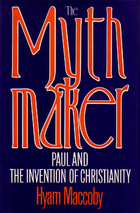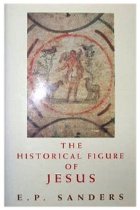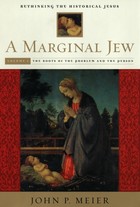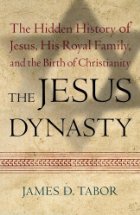Updated 18th January, 2013. 8:40 pm.
I recently confessed that I have too often written with the assumption that my points are surely so well-known that there is no need to explain them. This post attempts to make amends for one such recent gaffe. I explain why I claimed Hoffmann is out of touch with most scholarship with his views of the Judaism of Jesus’ and Paul’s day.
In my latest post addressing Hoffmann’s argument for an historical Jesus, I dismissed his claim that Paul came from a tradition that knew only a vengeful God incapable of forgiveness. I assumed most readers would know that such a view of the Judaism of the early and mid first century is widely understood to be a misinformed caricature of reality. One commenter pulled me up on that point.
So here I quote views of scholars on the nature of Judaism, and the Pharisees in particular, in the time of Jesus and Paul. First, here are Hoffmann’s words:
[Paul] finessed his disagreements into a cult that turned the vindictive God of his own tradition into a being capable of forgiveness.
I brushed this aside with the following comment:
I am astonished that Hoffmann would write such an unsupportable caricature as if it were fact. His view is surely out of touch with most scholarship that has addressed this question.
So I pulled out books from my shelves that I could quickly identify as having something to say about this question. I avoided any titles that might be associated with scholars of mythicist leanings or left-right-out-radicals, however. I tried to stick to well-known or highly respected names in the field and especially to include relative “conservatives” in the mix.
So here are the sorts of things I have been reading over the years and that have led me to conclude that certainly a good number of scholars no longer accept Hoffmann’s characterization of Judaism or Pharisaism today. Note the number of times they denounce as a modern myth any notion that God was harsh or that Jews did not know divine forgiveness.
 Hyam Maccoby: The Mythmaker: Paul and the Invention of Christianity (1986)
Hyam Maccoby: The Mythmaker: Paul and the Invention of Christianity (1986)
In recent years, many Christian scholars have come to realize that this Gospel picture of the Pharisees [i.e. severely and cruelly legalistic, hypocritical and self-righteous] is propaganda, not fact. Our main source of authentic information about the Pharisees is their own voluminous literature, including prayers, hymns, books of wisdom, law books, sermons, commentaries on the Bible, mystical treatises, books of history and many other genres. Far from being arid ritualists, they were one of the most creative groups in history.
Moreover, the Pharisees, far from being rigid and inflexible in applying religious laws, were noted (as the first-century historian Josephus points out, and as is amply confirmed in the Pharisee law books) for the lenience of their legal rulings, and for the humanity and flexibility with which they sought to adapt the law of the Bible to changing conditions and improved moral conceptions. . . . (p. 19)
 E. P. Sanders, Jesus and Judaism 1985
E. P. Sanders, Jesus and Judaism 1985
On page 202 Sanders addresses the popular view that Jesus was hated and killed by the Pharisees because of his teaching and good works. The Pharisees (that tradition from which Paul came) did not believe in a God of grace and forgiveness.
The position is basically this: We (the Christians, or the true Christians) believe in grace and forgiveness. Those religious qualities characterize Christianity, and thus could not have been present in the religion from which Christianity came. Otherwise, why the split? But the Jews, or at least their leaders, the Pharisees, did not believe in repentance and forgiveness. They not only would not extend forgiveness to their own errant sheep, they would kill anyone who proposed to do so.
The position is so incredible that I wish it were necessary only to state it in order to demonstrate its ridiculousness. But thousands believe it. . . .
Sanders then stresses
one of the things about Judaism which everyone should know: there was a universal view that forgiveness is always available to those who return to the way of the Lord.
Later on page 279 he explains
Pharisaism and Judaism were not as such legalistic.
 Sanders had another book published in 1993, The Historical Figure of Jesus, in which he writes:
Sanders had another book published in 1993, The Historical Figure of Jesus, in which he writes:
Because of their devotion and precision, the Pharisees were respected and liked by most other Jews. . . . During Jesus’ lifetime, [the Pharisees] must be regarded as . . . deservedly popular and respected. (pp. 45-46)
Sanders goes on to show that the disputes between Jesus and the Pharisees in the Gospels were really for most part quite trivial. He reminds us of a second century BCE “letter of Aristeas” in which the character of the Jews is portrayed:
The author of the Letter of Aristeas wrote that Jews honour God ‘not with gifts or sacrifices, but with purity of heart and devout disposition.’ . . . The sentence means ‘not only with sacrifices, but even more with purity of heart’. (p. 219)
 I have not read E. P. Sanders’ book Paul and Palestinian Judaism (1977) but this is from N. T. Wright’s summation of that book’s argument:
I have not read E. P. Sanders’ book Paul and Palestinian Judaism (1977) but this is from N. T. Wright’s summation of that book’s argument:
What Paul really struck at was the foundational Jewish belief in the inalienable election of Israel as a family, a nation . . . . Paul’s so-called ‘critique of the law’ is really a critique of the idea that the people of the one true god can be, in principle, confined to one nation. (p. 381 of Jesus and the Victory of God)
N. T. Wright, Jesus and the Victory of God, 1996, agrees with Sanders insofar as
He [Sanders] rejects, rightly, any idea that what Jesus found amiss with Pharisaic teaching was ‘pettifogging legalism’. (p. 382)
 Geza Vermes, Jesus the Jew, 1973
Geza Vermes, Jesus the Jew, 1973
In the identification of the greatest commandment — love of God and one’s fellow-men — Jesus is represented as sharing the outlook and winning the approval of the Pharisees. (p. 35)
There is little doubt that the Pharisees disliked his nonconformity and would have preferred him to have abstained from healing on the Sabbath where life was not in danger. (p. 36)
 John P. Meier, A Marginal Jew: Rethinking the Historical Jesus (Vol. 1) (1991)
John P. Meier, A Marginal Jew: Rethinking the Historical Jesus (Vol. 1) (1991)
It is probably not just a coincidence that, while the Synoptic Gospels present Jesus in frequent conflict with scribes, Pharisees, and local “rulers of synagogues,” at least he speaks to these groups on a regular basis. The lines of communication are open, even if they are often red hot. Moreover, in a few instances the rulers, scribes, or Pharisees appear in a neutral or positive light . . . (p. 346)
 Gerd Theissen and Annette Merz, The Historical Jesus: A Comprehensive Guide, 1996
Gerd Theissen and Annette Merz, The Historical Jesus: A Comprehensive Guide, 1996
Jesus shared the basic religious convictions of the Pharisees . . . He did not share the Pharisee’s strategy of demarcation from all that was alien, based on ritual commandments. Against their defensive notions he put forward the notion of an “offensive” purity (Berger, Jesus). Purity, not impurity, was infectious. Therefore he could approach sick people who were unclean . . .
According to the tradition, Jesus’ personal relation to Pharisees was . . . ambivalent. As well as vigorous polemic against the Pharisees . . . we find — especially in Luke — references to a friendly relationship . . . Pharisees repeatedly invite him to meals . . . . However, Luke regards Christianity generally as a continuation of Pharisaic belief: the Lukan Paul appeals to the fact that he is a Pharisee even when he is a Christian . . . (pp. 229-230)
 Bruce Chilton, Rabbi Jesus: An Intimate Biography, 2000
Bruce Chilton, Rabbi Jesus: An Intimate Biography, 2000
Jesus applied in a radical way a principle articulated by [the Pharisee] Hillel regarding immersion . . . (p. 89)
Christian theology and scholarship have persistently overlooked Jesus’ distinctive approach to the entire issue of purity [a principle interest of the Pharisees]. They have denied that Jesus was concerned with purity and rejected any consideration that his actions stemmed from his insights into what was clean or unclean. Their views are uninformed and misleading. . . . Purity was Jesus’ fundamental commitment, the lens through which he viewed the world. (p. 90)
Although the Gospels portray the Pharisees as the stock villains in the drama of Jesus’ life, they were decent (if somewhat pompous men, with a considered understanding of religion, grounded within the authority of the Torah and reasoned debate in the community. (p. 118)
 Maurice Casey, Jesus of Nazareth, 2010
Maurice Casey, Jesus of Nazareth, 2010
Another point is the relative leniency of the Pharisees in judgement (Ant. XIII, 294), in contrast with the severity of the Sadducees (Ant. XX, 199) (p. 318)
 Amy-Jill Levine, The Misunderstood Jew: The Church and the Scandal of the Jewish Jesus 2007
Amy-Jill Levine, The Misunderstood Jew: The Church and the Scandal of the Jewish Jesus 2007
Christian readers usually presume Pharisaic evil, and the Gospel is complicit in setting up this conclusion. . . . But it is Luke, not Jesus, who provides the context for the parable. By Luke’s time, the Pharisees had come to represent for the church the Jews who refused to follow Jesus; their portrait is primarily composed of polemic, not objectivity. Yet even in Luke’s Gospel, hints of a more benevolent Pharisaic view do seem to peek through. Not only do Pharisees continue to host Jesus at dinner parties and so keep the doors of communication open to the intimate setting of a shared meal; they also advise Jesus, “Get away from here, for Herod wants to kill you” . . . . (pp. 39-40)
Church homilies and sermons, daily and weekly Bible study, and even respected academic monographs depict, both explicitly and implicitly, a Judaism that is monolithic, mired in legal minutiae, without spiritual depth, and otherwise everything that (they hope) Christianity is not. Pastors, priests, and religious educators, Christians well aware that the New Testament has been interpreted in an anti-Jewish manner, wind up perpetuating anti-Jewish teaching nonetheless.
This caricature of Judaism meets several needs. On the most crass level, it allows Jesus to stand out, if not be unique within, his social context. . . . (p. 119)
 Paula Fredriksen, Jesus of Nazareth, King of the Jews, 1999
Paula Fredriksen, Jesus of Nazareth, King of the Jews, 1999
On discussing the Gospel’s portrayal of Pharisees following Jesus and his disciples into the cornfields to see if he would pluck corn on the sabbath, Fredriksen comments:
This is polemical caricature, not realistic portraiture. (p. 167)
On the same page Fredriksen further comments on the regular controversies Jesus had with Pharisees:
Argument here implies mutual involvement, common concern, shared values, religious passion. If one party or the other had thought the issues unimportant, there would have been no fight.
 James D. Tabor, The Jesus Dynasty (2006)
James D. Tabor, The Jesus Dynasty (2006)
[The Pharisees’] interpretation of the Jewish Law was more liberal and accommodating to change [than that of the Sadducees]. Although there was a more rigidly conservative wing of the Pharisees led by the 1st-century Rabbi Shammai, his rival Rabbi Hillel seemed to have the greater influence. It is common to think of Jesus as the bitter enemy of all Pharisees when in fact many of his views on Jewish Law reflect the more accommodating positions of Rabbi Hillel. Hillel and Jesus both emphasized “love of neighbour” as primary and quoted the “Golden Rule” as a thumbnail summary of the Torah and Prophets. (p. 119)
 Michael Grant, Jesus: An Historian’s Review of the Gospels (1977)
Michael Grant, Jesus: An Historian’s Review of the Gospels (1977)
As Haim Cohen has recently written:
They [the Pharisees] studied the word of the Torah and indulged in continuous contemplation of the right, in an insistent search for the ethical life. They possessed a wide reputation for piety, tolerance, wisdom. This reputation clothed the Pharisees with enormous power, used with remarkable restraint. They were loath to impose punishment for crime, and when compelled by evidence to do so, inclined towards leniency. They treated one another wiht great affection, and were generally mild and temperate to opponents. . . . .
Such were the principal leaders of Judaism in Jesus’ time. (p. 112)
 Morton Smith, Jesus the Magician (1978)
Morton Smith, Jesus the Magician (1978)
Almost all gospel references to Pharisees can be shown to derive from the 70s, 80s and 90s, the last years in which the gospels were being edited. The evidence for this is . . . full and many-sided . . . . From that evidence it appears that some Pharisees may have had some differences with Jesus, but the serious conflict between Christians and Pharisees grew up in Jerusalem after Jesus’ death . . . (p. 29)
 Everett Ferguson, Backgrounds of Early Christianity (2003, 3rd ed)
Everett Ferguson, Backgrounds of Early Christianity (2003, 3rd ed)
Yet just as Epicurus was not an “Epicurean,” so the Pharisees were not “Pharisaical.” . . . . Much of Jesus’ ethical teaching finds parallels in rabbinic literature. Most often cited is the negative form of the “Golden Rule” attributed to Hillel. The effort to reduce the law to as few principles as possible (Matt. 23:36) was a rabbinic concern. . . . Hillel [said]: “What is hateful to you, do not to your neighbour. That is the whole Torah, while the rest is commentary: go and learn” (b. Shabbath 30b). (p. 517)
 Finally, we have James H. Charlesworth, in The Historical Jesus: An Essential Guide (2008) writing a section titled,
Finally, we have James H. Charlesworth, in The Historical Jesus: An Essential Guide (2008) writing a section titled,
Ten Modern Misconceptions about Judaism during Jesus’ Time
1) Unconscious of sin and no need for forgiveness.
Charlesworth points to the evidence to the contrary. He traces the history of this belief from early Christian history and anti-semitism back to the fourth century CE. He concludes:
All faithful Jews knew they had sinned. They knew only God could forgive, and they asked God for forgiveness. . . . Thus, Jesus and other Jews knew that confession of sin and forgiveness were deeply rooted in ancient Israel. (p. 52)
2) Legalistic laws.
It is misleading to think or claim that such legalism defined Judaism during Jesus’ time. As many scholars have recognized for decades, the Torah was not a legalistic document. Jews perceived it to embody God’s will. Torah evoked joy and celebration. (p. 53)
3) Election superiority.
Far too many historians fall into the all fallacy when they write or speak about Early Judaism; that is, either they use the word all when talking about Jews, who had astoundingly diverse views before 70 C.E., or they imply that, for example, Jews (meaning all Jews) considered themselves superior and the ‘elect of God.’
Documenting that claim is easy, but many different views are found in early Jewish texts. . . . (p. 53)
4) Polluted Temple.
Some Christian theologians assume or conclude that the Temple was polluted during the time of Jesus. . . . [But] Jesus revered the Temple, celebrated Temple liturgy, admired many of the priests, but was offended by some excesses in the cult and some of the injustices and abuses of some influential priests. (p. 54)
5) Corrupt liturgy.
This myth holds that in the time of Jesus liturgy and prayer were mechanical and meaningless. But Charlesworth discusses the literary (including Qumran) evidence that demonstrates otherwise:
Clearly, Jewish prayers during the time of Jesus are among the great masterpieces in the world’s storehouse of liturgy; they were unfettered, and the heart of the created could commune with the heart of the Creator. (p. 55)
6) Resurrection denied.
Far too many people think that only Christians believe in the concept of resurrection. . . . There is now no doubt that the concept of a general resurrection was developed by Jews long before Jesus. . . The Christian belief in Jesus’ resurrection is founded on Jewish concepts and beliefs. (p. 56)
7) Kingdom of God: A Christian creation.
It has . . . become clear that the concept of God as King and God’s Kingdom or Rule is found in many Jewish texts that date from the time of Jesus and centuries earlier. (p. 56)
8) No concept of salvation.
Some scholars have assumed that the concept of salvation and a “Savior” appears for the first time in early Christian belief. In fact, these concepts were present prior to Jesus’ time. Asclepius, the Greek and Roman god of healing, for example, was hailed as “the Savior” not only in inscriptions but also in Orphic Hymn 67. The author of the Wisdom of Solomon, sometime perhaps in the second century B.C.E., claimed the serpent mentioned in Numbers 21:4-9 was a “symbol of salvation” (16:6), but God was “the Savior of all” (16:7). (p. 57)
9) A distant God.
The Jewish apocalypses and apocalyptic literature can give the impression that Jews imagined God had abandoned earth and that truth and meaning were hidden far off in heaven. Charlesworth points out, however, that this same literature also depicts holy men (Enoch, Levi, Abraham) going into the heavens or future to obtain this divine wisdom and to return to share it with their fellows on earth.
So did Jesus really change the emphasis in apocalyptic thought when he taught his disciples to pray, “They kingdom come, thy will be done on earth as it is in heaven”? (p. 57)
10) A deteriorated religion.
Many famous Western thinkers have spoken of Judaism in Jesus’ day as a corrupt religion. Many today still believe
that Christianity “superseded” (gone beyond, improved, and replaced) Judaism.
Paul, Charlesworth points out, fought against this supersessionist myth when he wrote, “I ask, therefore, has God rejected his people? By no means!” (Rom. 11:1).
An interesting exercise
When surveying all these books together across a common theme I was hit with the obvious ideological biases of their respective arguments. Jewish authors are at pains to argue that their religion was never bad, and a rabbi author insists rabbis have always been high and nobly minded. Christian scholars are straining for political correctness against the damaging prejudices of the past as if their scholarly projects must be defended ideologically. But this is where scholarship is at the moment. Ideology versus ingrained prejudice and habits of thought. Facts, evidence are in there somewhere.
And above all when it comes to the question of historical method, it is quite laughable to see some authors using certain gospel texts as firm evidence for the character, even the existence of Jesus, while other scholars dismiss those same tests as nothing more than mythical propaganda. I’ll return to this point to illustrate some fundamentals next time I address historical methods among historical Jesus scholars.
Finally, I wonder if this post will put to rest those regular accusations that I supposedly only read mythicist books and am ignorant of mainstream scholarship. 😉
If you enjoyed this post, please consider donating to Vridar. Thanks!

Very useful stuff, Neil. To this great list of books, I would add Jewish Contemporaries of Jesus: Pharisees, Sadducees, Essenes by Günter Stemberger.
I think the problem may be worse among Protestants and ex-Protestants. Recall recent criticisms of Wellhausen over his prejudice regarding the formality and structure of Temple Judaism as being “inauthentic” or “degenerate.” Protestantism’s caricatures of Catholicism have affected its view of Judaism — as a decrepit, corrupt, legalistic, hypocritical mess that deserved to be swept aside and replaced with something new, but at the same time more authentic and true to God’s will.
Frankly, I think you are too generous in your interaction with those commenters. They came to your blog, made some rude comments accusing you of the blatant intelectual dishonesty they themselves displayed and didn’t contibute any argument to support their views, unless of course restating one’s position is regarded an argument.
No, I think this reply is worth it. Even if you share Neil’s view, you have to admit that Neil was accusing Hoffman of not using any references for his claims, but was basically doing the same in that post. That doesn’t mean that Neil has to rehash lots of stuff he has already written extensively about, but a link or two to older posts suffices. So this is a very good response, and more than what was needed, so it stands on its own. It’s a good post to link to when this comes up next time.
I agree, this is a great post.
Maybe my comment was a bit harsh; after reading this post I went to read the thread that triggered it thread that triggered it, and I got very annoyed by the tone of the first message.
Firstly, nobody accused anybody of intellectual dishonesty. We said that Neil didn’t state his case beyond the fact that other people say differently than Hoffmann. Secondly, no one was rude. Pointed, sure; but not rude. Thirdly, my viewpoint on the matter of the HJ is irrelevant to my critique that Neil didn’t actually support what he said.
Anything else?
You are right about the intelectual dishonesty thing. And I may misinterpreted the tone although the line between “pointed” and “rude” is not as clear, where does starting your comment by descrbing the post as “this little tirade” stand?
I’d say that it was pointed, but you’re free to disagree. (I posted this once already. Was it not approved?)
_—————-
I deleted it because the exchange is slipping into something unpleasant and I want discussion to stick to the issues. Your tone is clearly antagonistic and generating further unpleasantness. No more snide remarks. Stick to the issues. — Neil.
Wow, Neil, thank you. I’m familiar with some of these points but not all. This was indeed a generous response.
[Paul] finessed his disagreements into a cult that turned the vindictive God of his own tradition into a being capable of forgiveness.
I didn’t think Hoffmann was referring specifically to the Pharisees here but I guess it could be read that way. Hoffmann said “capable” so you’ve made your point there. (I AM would presumably be capable of anything.) Now would you characterize the God of the OT as essentially a God of forgiveness?
Well, scholars like Hoffmann *have* to believe things like, “[Paul] finessed his disagreements into a cult that turned the vindictive God of his own tradition into a being capable of forgiveness,” don’t they? Otherwise, Christianity’s supposed historical origins are even less believable than they already are. Demonizing the Pharisees just makes their job that much easier.
Hoffmann isn’t picking a fight with the Pharisees in that piece. It’s a heroic narrative where God is “us” and a breakthrough in religious consciousness reverberates for the rest of history. It’s a familiar story, but damn. Hoffmann is one hell of a writer.
Neil’s objection, it seems to me, is that the devil is in the details.
I have updated the post with a passage from Tabor and another from Levine that I overlooked last night. I’ll probably return here to add others from time to time as I chance upon them.
If one understands the operative word ‘tradition’ in a looser sense than Neil allows it, i.e., if ‘tradition’ isn’t restricted to the Pharisaic tradition, then the sources Neil quotes don’t really undermine what Hoffmann wrote at all. The tradition within which Paul is working has to deal with or explain the many textual instances where God acts out violently, arbitrarily, or cruelly towards his own people or people other than his own. Paul argued that this God’s final—or, if Paul really believed in Hell, then perhaps it was his penult—act of cruelty was against his only son. Thus, from a certain vantage point, what Hoffmann says is true: Paul did, in his own way, make the God of his tradition capable of forgiveness. With that said, I think Hoffmann is partly wrong: it’s not that God was before incapable of forgiveness, as Neil rightly points out; it’s that this forgiveness wasn’t extended universally to gentiles. Paul basically uses the event of the crucifixion to proclaim the end of the religious exclusivity of Judaism. Hoffmann is also wrong to think that that is without historical precedent, but that is a different topic.
Any normal reading of Hoffmann’s reference to Paul and Paul’s tradition would understand that he is talking of the tradition Paul claimed for himself: Judaism, Pharisaism: See Philippians 3:4-7.
You assert that Paul “has to deal with or explain the many textual instances where God acts out violently, arbitrarily, or cruelly towards his own people or people other than his own” but you do not support this with any evidence. There is none as far as I am aware. For Paul God is always true (Romans 3:1-2) and his treatment of his son was an act of grace, not cruelty. Cruelty by God is never hinted at by Paul.
Hoffmann said Paul turned a vengeful God into a God capable of forgiveness, but Hoffmann nowhere supports his assertion that Paul was at any time troubled by the character of God. What worried him was his inability to live up to God’s standards, but he also insisted that God be true though every man a liar. Paul’s God never changed his standards. Paul found a way to meet God’s standards of righteousness through inward change of heart — to have God in him, It was the same God.
Paul himself warned that that same God would mercilessly judge and condemn all sinners, Jews and Gentiles:
I think it’s time you called upon Hoffmann to support his assertions.
I reread Hoffmann’s post, normal this time. I’d say my reading of it was right: Hoffmann is referring to something more expansive than the Pharisaic tradition. Try situating the text you’ve selected to critique in relation to the essays opening: in the hands of Paul, Jesus, as God’s chosen one, represented the end of God as law-giver, and ushered in a new era of God as grace-giver. Regardless of his Pharisaism, Paul preached this message.
I’m glad you’ve managed to get Hoffmann off the hook by finding a way to interpret his “vengeful God incapable of forgiveness” who so tormented Paul into a banal truism. Would you like to try to support your assertion that this is Hoffmann’s meaning, though?
I think that this paragraph provides some context to the disputed text:
I think that what Hoffmann means by “vengeful God incapable of forgiveness” is quite clear in relation to what I just quoted.
And I think he meant something else. (Just saying “I think he meant what I say he meant” is not an argument and certainly nothing even close to a justification for your case. If that’s all you think an argument is then I don’t know why you objected to my initial post responding to Hoffmann in the first place.)
Here, I’ll show you. If I want to establish what he meant by a certain passage, I’ll go to the original source where he wrote it and point to the context and thereby demonstrate exactly what he did mean. — None of this “I think” business. So if you have a look at his book (the relevant chunks of it are online in Amazon, you can see on page 10 that this same God of Hosts has always been embraced by Christianity in justifying slavery and oppression of women, subservience to violent authority — all things Paul taught!
You will also read on page 10 that he relates this same God even to liberal Christians as much as fundamentalist Christianity. He claims that though these liberal Christians are not themselves violent, they nonetheless condone a state of violence in the name of their God. He explicitly states this has blood-guilty war-mongering God of Hosts is the God of Abraham, the God of the Christians, and the God of the Muslims, though each refer to him by a different name.
So Hoffmann is speaking not of Paul at all here but of the way all three religions of the book subscribe to this God from the beginning right up to today. If Paul is understood anywhere at all in this scenario, he is clearly in the Christian camp of devotees to likewise fostered the sins I mentioned above (subjugation of women, slavery, submission to violent authority) and further, preached vengeance upon those outside his own faith, the disbelievers and unrepentant.
Yes, it’s clear that you think he meant something else. We wouldn’t be having this discussion otherwise, would we? (Just to be clear, that was supposed to be a joke, not a snide remark.) Seriously though, it seems that we have lost the plot. What exactly are you arguing for? I’m arguing that the ‘tradition’ in the sentence “he finessed his disagreements into a cult that turned the vindictive God of his own tradition into a being capable of forgiveness” should be understood broadly. I thought you were arguing that it should be understood restrictively. But now we are having a conversation about … what exactly?
I agree with your summary of our respective positions. My last post discussing the context of his reference to the God of Hosts being a warmonger was an attempt to show it could not apply to Paul’s tradition in the sense you are thinking. The reason is because as Hoffmann discussed that term he applied it to the God of the Jews who preceded Paul but also to the God whom Paul himself taught and followed. Hoffmann’s whole point in his blog post is that Paul left the tradition he had known. But the God of Hosts as Hoffmann discusses him is equally applicable to the God of Paul after his conversion. So I conclude that what you pointed to as evidence for a “broader” interpretation falls to the ground.
But if it’s important enough to you why not just ask Hoffmann himself to not only explain but also justify his statement? (You wanted me to justify my assertions, after all.)
I had thought about driving down WordPress lane to Hoffmann’s blog to ask him what he meant, but I can’t imagine why he’d care about our little spat. I’m also having a hard time understanding why you’re looking for context outside of the essay we are discussing. My argument is simple: what comes before in the essay sets the stage for what comes after. We can understand what Hoffmann means by piecing together the relevant portions from within the essay. I’m not really sure what yours is. It seems to me that you are arguing that: 1.) Paul’s tradition doesn’t have to deal with the instances in which God is a bad actor (acting violently, cruelly, or arbitrarily) because Paul is a Pharisee; 2.) That Paul wasn’t troubled by the character of God, even though he felt he couldn’t live up to God’s standards; and 3.) That we should understand what Hoffmann means in one essay by ferreting around for context in another of his essays. Only 1 is obviously relevant to our discussion. (I’m not saying that the other two aren’t, just that it’s not obvious to me.) My reply to that is that the Pharisaic tradition is part of a book tradition that speaks of a God as acting violently, cruelly, or arbitrarily. That’s not a controversial claim, and it shouldn’t need citation; I should just be able to say “read the Old Testament. You’ll find what you’re looking for.”
Look, I’m more than willing to admit that I’m reading you wrongly, or that I’m misunderstanding something. I know I started out poorly here, but I’m not trying to be obtuse or antagonistic; I’m genuinely trying to figure out what you think.
Dan, the problem I have with your interpretation (and Hoffmann’s) is that you both appear to be confusing modern interpretations of the character of God in the Bible with those held by the Jews and in particular the Pharisees themselves. I don’t see it as valid to retroject our interpretation of their God as being cruel and unforgiving into their tradition. Their tradition has to be understood as they themselves understood it.
Paul’s God was the same before his conversion as he was after it; — Paul in fact stresses that God is never unjust, he never at any time faults God for his pre-conversion predicament and he does not change the character of God after his conversion. As a Pharisee he would have abhorred the very idea that God was unforgiving. This flies against Hoffmann’s claim that it was God’s unforgiving character that was the reason for Paul’s angst and eventual re-creation of God as a forgiving person.
Even after Paul’s conversion Paul’s God was the same God as before his conversion who demanded slaves submit to masters, women submit to husbands, everyone submit to violent rulers — the very qualities Hoffmann identifies with that violence-generating God of Hosts. Paul did not see this as unjust (as we do).
Oh, I get it now. You don’t like it that I think of a passage prior to “he finessed his disagreements into a cult that turned the vindictive God of his own tradition into a being capable of forgiveness” as setting the stage for it, i.e., you don’t like it that I think of the content of an essay as being internally consistent with itself. Is that fair to say?
Baloney. Read what I wrote. I pointed exactly to what Hoffmann himself explains whom the God of Hosts responsible for religious violence is referring. Hoffmann himself directly said that this violent God of Hosts is the God of Christians who teach subjugation of women, slavery and submission to violent authority — and who believe this God will punish unbelievers. That’s exactly the God of Paul AFTER his conversion. It’s not a matter of my “not liking” something. It’s a matter of plain, objective fact — just read his words.
I think Joe Hoffmann is often wrong; but maybe we’re not really giving him his fair due, here.
Today we have many apolgists for the Pharisees it seems. We are told the Pharisees were far more permissive than Jesus seems to say – to in effect, fellow Jews. But is that really what Hoffmann meant, when he suggested the Pharisees were not so permissive?
Given that there were many Greeks and Romans and Gentiles around, the real question might be: were they very, very permissive about those Jews who wanted to follow Hellenistic, Greco-Roman practices? Did they make serious concessions to … Gentiles?
E.g.: eating pork with Gentiles, for example. Or refraining from attacking them physically?
That is where we probably find even the most generous Pharisees, getting a little inflexible: bending to foreign ideas. While this is important: if both Philo, Jesus and Paul wanted to precisely bring Greco-Roman influences into Judaism, then they would have met resistence, even from slightly liberal jewish Pharisees, no doubt.
Why are you trying to pretend Hoffmann said something he didn’t say or meant something he didn’t write?
Was Paul was zealous of the Law because he was a Pharisee or was he a Pharisee that happened to be zealous of the Law?
Charlesworth: There is now no doubt that the concept of a general resurrection was developed by Jews long before Jesus. . .
I thought one thing that distinguished the Pharisees was their belief in resurrection.
I don’t understand your first question or its point, sorry. As for the second part of your post, Pharisees were Jews who believed in the resurrection long before the time of Jesus. No doubt many other Jews not belonging to this “religious order” likewise believed in it.
Misconception # 2 objects that Judaism wasn’t legalistic, but the Pharisees at the least devoted themselves to refining the Law, developing ritual purity standards and so on. And as BG alludes, they opposed Hellenization. So, Paul’s break with that tradition at least was radical.
I don’t understand your point… Never mind.
No doubt many other Jews not belonging to this “religious order” likewise believed in [resurrection].
OK. No doubt.
I only hit the highlights in the quotations I selected. Most of those sources contained much more in depth discussion. One point often made was that the interest in how to conform to God’s will (Torah) preoccupied the Pharisees and others but that does not mean the rulings were made in an onerous manner. It was an intellectual pursuit concerned with attitudes as much or more than iron rules. Opposing foreign ways (many Jews welcomed Hellenization, though) does not mean that they had an idea of an unforgiving God or enforced hated restrictions on people. Many of the Jews welcomed Hellenization — we can see strong Hellenistic influences in their literature. They did not all think alike. One of the authors I quoted speaks of the “all fallacy”.
Did I say the Pharisees rules were made in an “onerous manner”? Did I say ALL Jews opposed Hellenization? Did I say one word in this post about an unforgiving God? Did I suggest the Pharisees enforced “hated restrictions on people”? Again, did I say ALL Jews opposed Hellenization?
Why No, No, No, No, and No.
I mentioned some fairly well-established, uncontroversial things about the Pharisees that might have led to the impression that they were “legalistic” and from which Paul departed. You know, I have heard of Hellenized Jews.
Neal, thank you for putting this post together. I appreciate it. Good night!
Sorry I misinterpreted you. I was interpreting everything through the point of the original post which was the unsupported claim by Hoffmann that Paul’s “tradition” (Judaism/Pharisaism) itself was an unhealthy culture and mindset that he overturned in order to start a new religion. That’s all.
On the question of the Pharisaic attitude toward Hellenization, regardless of how they may present themsleves, Eisenman points out the consistently pro-Roman behavior of their members and leaders.
Rabbi ben Zakkai (founder of post-70 rabbinic Judaism), Josephus, Paul and Pollio and Sammeas (Hillel and Shammai?)were all pro-Roman. The first two even claimed that Vespasian was the Messiah.
This behavior is demonstrably typical of the Pharisees and post-70 rabbis from Maccabean times to the Bar Kochba revolt.
The trouble I have with understanding what Pharisaic Judaism was like is that the sources for such, like much of Christian writings, come from after the fall of the Second Temple. Not to say that this makes them invaluable. Not at all.
But as the lone Eisenman fan here, I see the Dead Sea Scrolls as an even better source, at least for knowing what the actual opponents of the Pharisees thought of them during the time that they existed.
When it comes to what “kind” of Jew Jesus may have been (if he existed), I think the DSS also provide better insight into this, for reasons extending beyond their earlier dating, because I am convinced that are the writings of the “Church of God in Judea.”
Yes, I agree that there is a serious problem with using post 70 sources to interpret Pharisaism in the first half of the first century. To be fair to a number of those I quoted here, though, some do use the DSS as evidence, along with other Second Temple literature, as evidence of Judaism in the early first century. I chose to quote only the conclusions or summaries of their views and not all their discussion and evidence cited.
I understand, though if I recall correctly, not many see the DSS as being written by the opponents of the Pharisees.
In reference to “Was Paul was zealous of the Law because he was a Pharisee … ” from Claude above its interesting that Macoby, in the book cited by Neil, goes to some length to dispute the claim that Paul was a Pharisee.
See Ch 6 “Was Paul a Pharisee?”
Macoby’s answer – “Beloved as is this view [that Paul was educated as a Pharisee and used rabbinic logic] of scholars, it is entirely wrong.” p.61
Macoby continues in Ch 7 to deny Paul as a Pharisee.
The concluding sentence of this chapter – “We must conclude, therefore, that the allegedly profound Pharisaic style and atmosphere of Paul’s writing is itself a legend”.
Interesting.
Is it only in Philippians that we read Paul identifies himself as a Pharisee? I would have to refresh my reading of Maccoby to recall the controls he uses for his argument — are they all post 70? One can’t ignore the epistolary persona — that we can’t ignore the possibility that Paul is a literary persona and the real author/s remain debatable or unknown. If so, it would be interesting to compare the Pharisee image with the times and circumstances other Christians were coming to use the term pejoratively.
I would have to re-read Macoby in detail to give an accurate precis.
He says that ‘Paul’ wrote c 50-60 and the gospels 70-110.
Mac citesPaul as being an Israelite/Benjamite/Abrahamic stock at Romans 11.2 and then the Pharisee stuff at Phil 3.5.
From memory I think Mac is pretty much calling [in diplomatic language] Paul a liar [‘not above deception’] to ‘increase his status’.p6.
Again from memory I think Mac jumps around a bit, quotes Acts, but skeptically, orthodox [should that be ‘conventional’?] in a lot of his analysis, an HJer [JC was, according to Mac a Pharisee] and so on.
I read him for his Jewish perspective and because he does a bit of tangential thinking.
Part of his denying of Paul being a Pharisee is because he says that in cases where Paul is supposed to use the rabbinic Pharisaic style of argument [qal-va-homer], he actually does not do so.
Romans 5.10, 5.17,11,15,11,24 Ch 7.
That is interesting.
Ehrman: Why would Paul lie? (IIRC in re Gal 1:19)
Maccoby: Because [in diplomatic language] he’s a liar.
“[Paul] finessed his disagreements into a cult that turned the vindictive God of his own tradition into a being capable of forgiveness.”
It is hard to make this statement alone do the work Neil asks of it. The core Pauline myth that Christ brought a new covenant of grace to replace the old covenant of law (Romans 6:14) supports Hoffmann. Law is vindictive while grace is forgiving. So we see the line in the Sermon on the Mount at Mathew 5:38 replacing ‘eye for an eye’ with ‘resist not evil’, replaces revenge with love as the principle of justice.
These questions can profitably be placed in the context of the theology of the fall at Romans 3:23: “All have sinned and fallen short of the glory of God.” The Gospels present Christ’s primary relations as with his own people, so he uses them as types for sin, for the fallen depravity of all humanity, but there is no sense from Christ that the Jews are any worse than anyone else. Indeed, the Jews only handed Christ over out of fear of Roman wrath, as a desperate token of imperial loyalty from a humiliated vassal, a context that if anything suggests the Gospels present the Romans as even more sinful than the Jews.
Jesus Christ was philo-Semitic, standing inside his Jewish heritage, as when he says at Matthew 5:18 that he has come to fulfill the law of Moses down to the last jot and tittle, but seeking to transform the law with a new impossible vision of universal love.
Paul said the law was “holy, just and good”. Romans 7:12. That does not sit with Hoffmann’s contextual notion of “vindictive”. The law also provided for ways of forgiveness. Remember the law was “torah”.
The Sermon on the Mount is a different topic and I don’t see its relevance to Paul’s writing, but for what it’s worth, it was little advance over the precepts of the Law and the Prophets. See Leviticus 19:18 for starters. And keep in mind that Jesus cited the two greatest commandments from the Law itself.
Paul expresses personal torment over sin, but I know of no evidence that this is related to a concept of a vengeful God incapable of forgiveness. That’s what Hoffmann is saying and he offers no support for his claim. Paul would be horrified at Hoffmann’s portrayal of God. Paul nowhere changes his view of God in his writings. Does anyone care to ask Hoffmann to support his assertion? Presumably he will reveal all in his book.
Added three more: Grant, Smith (a la Morton) and Ferguson.
@John — 2013/01/19 @ 7:41 am
Intrigued by your comment I went and read Eisenman’s fascinating “Paul as Herodian.” Eisenman proposes that Paul was affiliated with this lot:
Much obliged!